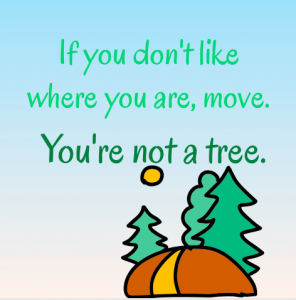I love to take the opportunity of a new year to reflect on life, see how I’ve done over the past year (or two) and decide on a course for the new year. New Year Resolutions do however have a bad rep and I’m not advocating for the emotional and often unrealistic resolutions like “I’m never going eat chocolate again”, or “I’ll go to gym every single day of the year”. This post is more about a well thought out and considered set of goals that one can actually stick to.
Why do I set goals?
I get frustrated doing the same thing each day and letting life just fly by. There’s a great saying that I LOVE.
If you’re not happy where you are, move. You’re not a tree. ~Jim Rohn

One can philosophise and get all deep about things, but really, if you aren’t happy with any aspect of your life then you need to do something about it. And even if you are happy but would like to improve, you need to actively do something else or you’ll just stagnate and look back over a few years time and wonder where life has disappeared.
And when I reflect and set goals, it’s not just financial goals as money is simply one aspect of life. I change things up as my circumstances change but I look at areas such as my work life, relationships, physical health, finances, home, learning and any areas where I’m looking to make some changes or improvements.
How do I set goals?
1 – Reflection
I always start off by reading my previous years goals and looking at how I did. Some goals are always achieved whilst others not. It’s interesting to spend a bit of time thinking about what has changed, whether I still actually want to achieve certain goals, were the goals too hard and what my current priorities are.
I also reflect on life….
- Am I enjoying my job?
- What would I like to do differently?
- What’s really frustrating me about life?
- What really excites me?
- What do I spend most of my time on? And why?
- Who are my friends and what do I get form the relationships? (not favours LOL, I mean growth, advice, accountability, enjoyment, etc)
- What is the most important thing for me to achieve this year?
- How much time am I spending online?
- Am I spending enough time doing things that I really love?
This process can take me anything from an hour to a week. Depending on how much time I have, my mood and I guess how relaxed I feel. I don’t like to rush into anything and would rather spend more time getting myself into the right frame of mind and really applying honest and insightful reflection. This time really paves the way for successful goal setting.
Reflection is the foundation for effective goal setting.
2 – Goal setting
Once you’ve had a really good think about life, where you’re at and where you’re headed, that’s when the actually goal setting can start.
I like to categorise my goals across various areas of life that make sense to me and my current circumstances.
- Physical Health
- Finances
- Education
- Family Life
- Relationships
- Work / Business
- Blogging
- Add your own
I used to be quite pedantic about wording and ensuring that all my goals are SMART (Specific, Measurable, Achievable, Realistic and Time Bound) but these days, less so. I think I know myself well enough to understand what I mean and I have also been setting goals for many years so have found what works for me.
If you’re new at goal setting I would certainly recommend finding a template-style way of writing goals but don’t get too stuck on it as you’ll find your groove.
I do like to be specific about what it is I want to achieve with each goal and I don’t mix multiple outcomes into a single goal. I write one-lines eg:
- “Grow my net worth by 10% from Rxxxx to Rxxxx”
- “Compliment my husband at least once every day”
- “Be 100% debt free by the end of the year” ****
*** Note that my debt free goal has been on the list for 4 years now. I kept a spreadsheet of my home loan and projected pay back and have calculated a goal for each year. 2020 is my year of becoming 100% debt free.
I keep my goals specific, short and easy to measure. I also sometimes add a reason as to why I would like to do something. This can add motivation during the year.
Constant reflection and adaption
Once I’ve got a set of goals (usually around 10 or more) I create a document that will help me track the progress. I then look at it every month or so and update the progress.
Sometimes though one finds that priorities have changed or some major incident has caused a goal to no longer be possible. That’s okay as life throws curve-balls. All I do in such situations is either change the goal, or scrap it. But most important is to reflect on what has changed, and write down your thoughts on the situation and how you’re feeling.
Final thoughts on goal setting
There’s no single “right way” to go about setting goals and it’s also pointless to get really upset when you don’t achieve goals.
Life is all about growing and learning and goal setting is simply about trying to steer or shape areas of your life.
Sometimes we’re too emotional when setting goals and set unrealistic ones.
Sometimes we set goals based on what others will think about them instead of focussing on ourselves.
At time we just get it all wrong and change our minds after a few months.
Sometimes we read a book or watch something that makes us think differently about life.
Sometimes a major life event such as a death in the family causes us to do major reflection.
Always have a plan. Constantly reflect on it and adapt as needed.
Here are some previous posts I’ve written on goals:
New Years Resolutions – anytime!


